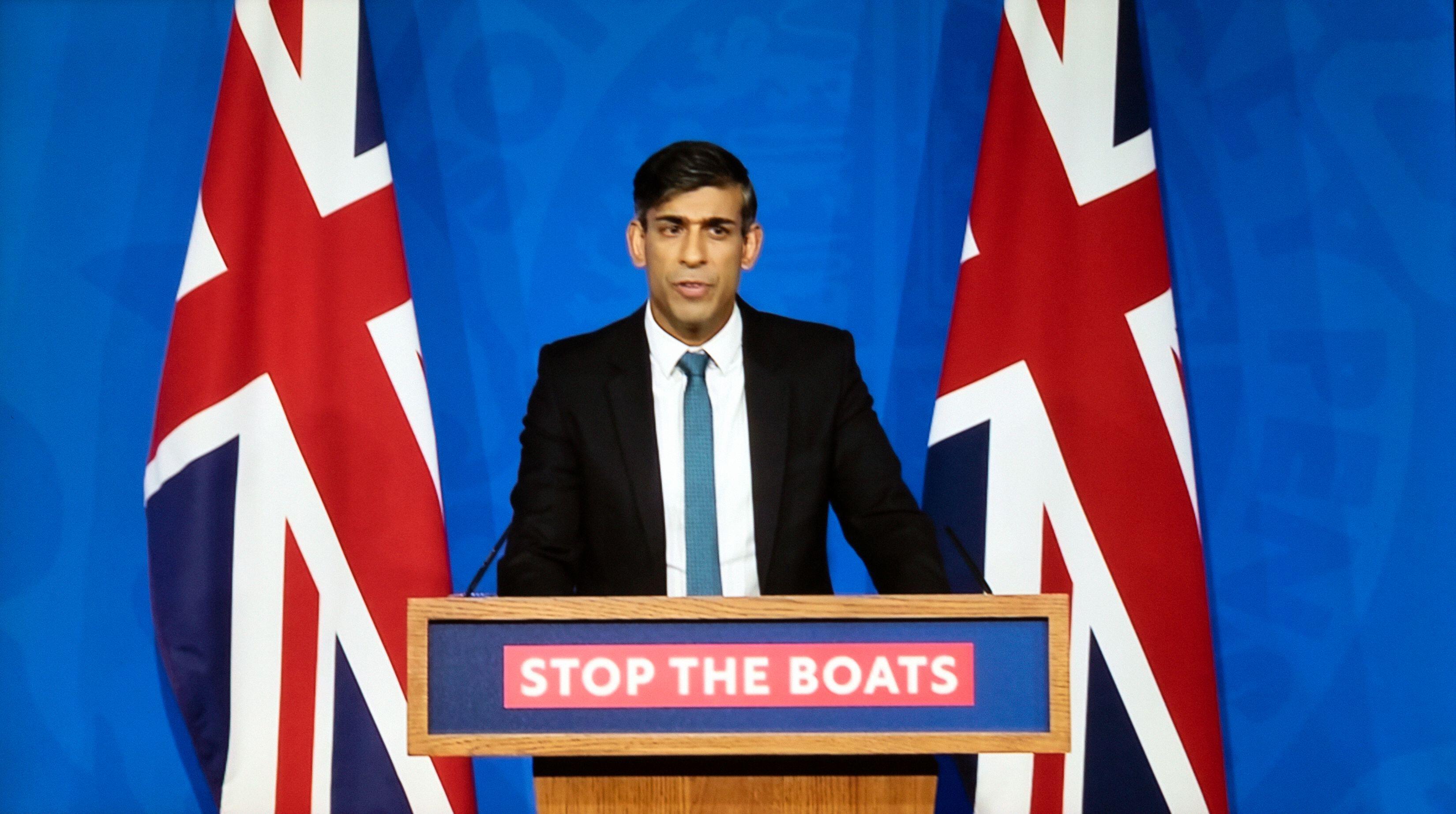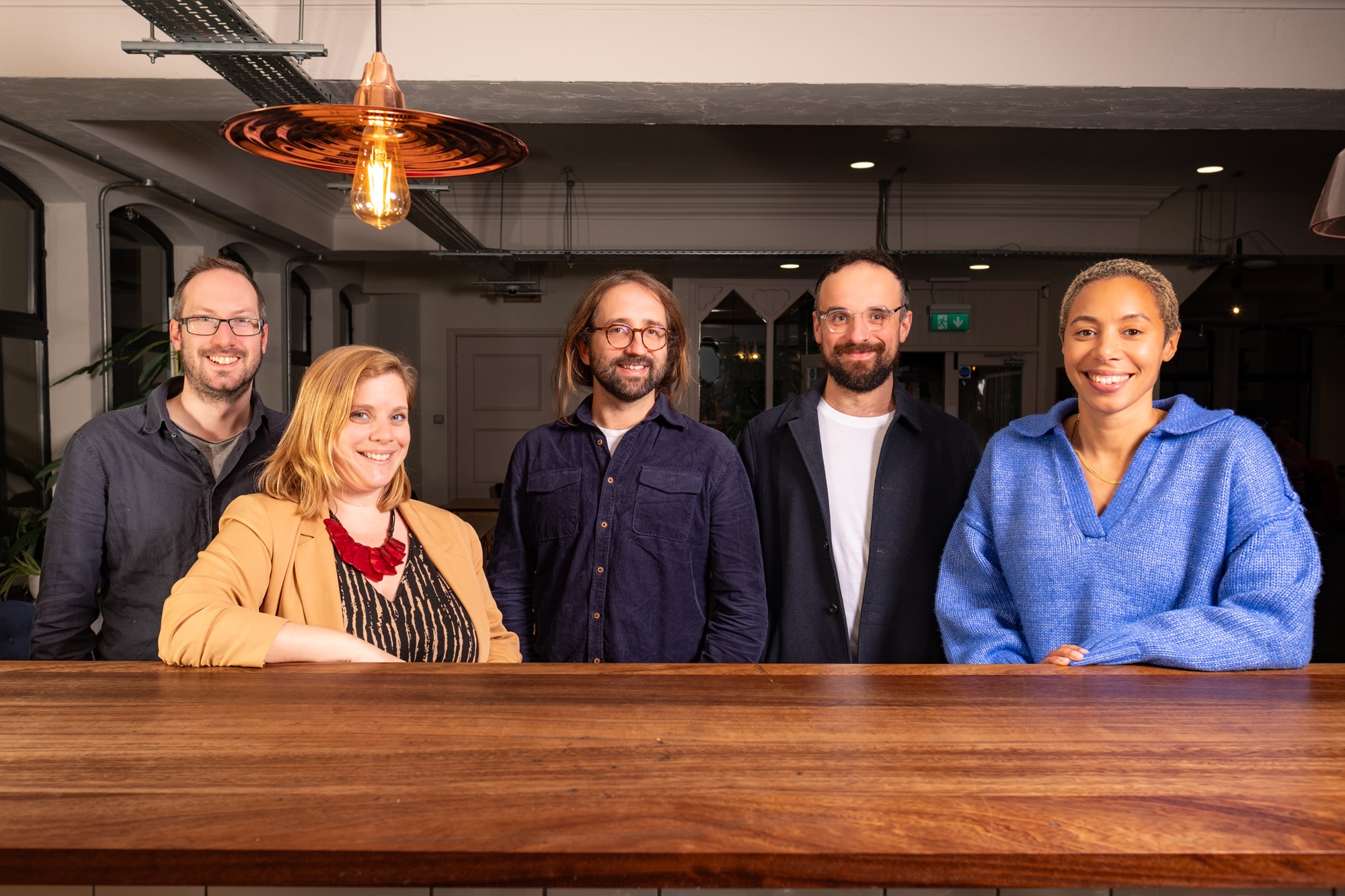How much does the Red Wall really care about immigration?
Conservatives have brandished migration fears as key to retaining Labour strongholds they won in 2019. But recent polling and interviews paint a more complex picture on migration - and while many voters are back to pre-Brexit positions, many are also saying they won't bother to vote in 2024 at all.
“I have no problem with immigration — I’ve lived all over the world and I’m all for people moving and trying to make a better life for themselves,” says Steven, a homeless man in his 60s. “But homeless people don’t seem to get the same rights as immigrants and asylum seekers in this country.”
Speaking to The Lead in Warrington, Steven says he was evicted from his mother’s home days after she died and found himself living in homeless hostels in his hometown of Blackpool. “I was addicted to cocaine and alcohol at the time and I was put with people who had much worse drug use problems than myself, and of course I spiralled.” In Blackpool, where more than 12 out of every 100,000 people are homeless – double that of England on the whole – Steven says “immigrants are allowed to stay in hotels, with money for food and a pass for the gym and leisure facilities.”
Since the Brexit referendum, where many Red Wall constituencies voted Leave, and especially since the 2019 elections, when many of the same constituencies swung to Conservatives, politicians and the media have become obsessed with understanding what makes these voters tick. The Red Wall is a term most often used to describe constituencies in the Midlands and North of England that have historically voted Labour. Since Brexit and the following General Elections, though, the term has been used to generalise the specific subset of voters who made these two crucial, unexpected swings.
These shifts led many to conclude that voters in Red Wall towns and cities are largely anti-immigration, enough so that their vote hinges on the immigration policies of a party. Sophie Stowers, a researcher at UK in a Changing Europe believes that while may have been the case in 2016 to 2019, it isn’t anymore.
“Red Wall voters, particularly those Labour supporters who lent their vote to the Tories in the 2019 election, seem to have gradually shifted back to where they were pre-Brexit,” she tells The Lead. “However, that core group of right-wing Conservatives in these areas, who historically voted for the party, have shifted more towards the right, so I think it's wrong to assume that all these people in the Red Wall are obsessed with immigration, because they're actually not. It’s just that one group.”
"Red Wall voters, particularly those Labour supporters who lent their vote to the Tories in the 2019 election, seem to have gradually shifted back to where they were pre-Brexit"
Instead, she believes that for the majority of Red Wall voters, the problem is less immigration and more a feeling of being left behind. “A lot of people in the Red Wall are fed up with the political systems – there’s a feeling that their needs aren’t listened to,” she says, leading to a feeling of scarcity.
This is exactly where Steven stands. “I don’t blame immigrants, I blame the government,” he says. “Surely there’s enough to go around.”
Not a voting issue
A YouGov survey from 2021, which compared Red Wall opinions to those of the rest of the country, found that the majority of Red Wall voters (40%) agreed that immigration had generally been good for the country, with 33% stating the opposite. That said, this split is much closer than the survey's national panel, of which 50% said immigration had been good compared with just 24% who felt it was bad.
That said, Red Wall voters seemed to align more with the country as a whole on the question of whether “having a wide variety of different ethnic backgrounds and cultures is part of British culture”, with 50% and 54% agreeing respectively.
And, based on conversations between The Lead and voters in three Red Wall towns —Oldham, Halifax and Warrington — Stowers’ hypothesis that Red Wall voters aren’t so bothered about immigration anymore appears to be true.
Valerie, 69, from Oldham, says she doesn’t have any thoughts on immigration either way. “There are other issues to worry about in Oldham,” she says. “The NHS and all of the struggles with that, for one.” Valerie, who has lived in Oldham all of her life, said she has seen the town change — but not necessarily in terms of immigration. “The town centre has changed drastically, all the shops have closed.”
The number of people belonging to an ethnic minority living in Oldham is 22.5%, compared with 16.3% in Greater Manchester and 14% across the whole of England. Between the years 2011 and 2017, immigration has risen. While the percentage of those identifying as White British and Irish declining by 3%, the number of those identifying as Pakistani, Bangladeshi and White (Other) has risen by 21.6%, 21.1% and 173.5% respectively.
Shaq, 24, a second-generation Scottish-Bangladeshi immigrant living in Oldham, says that for him, immigration isn’t a voting issue. For the most part, he sees immigration as a positive for communities. “Most of the time people immigrate to try to live better lives for themselves or their children,” he tells us. “I think immigration can be good for diversity as we can learn from different people and their cultures.”
Speaking from his own experience, however, he believes areas with higher levels of immigration are likely to be more racist. “Nobody ever asked about my ethnicity before moving to Oldham, but here it’s one of the first questions anyone asks” he says. “I guess there can be positives and negatives to immigration.”
When it comes to immigration, Steve, in his 60s, from Warrington, says he’s very “live and let live,” but he does think having an amalgamation of different cultures in one area is a good thing — if not only for the food. “Moving here from Northampton [where immigration was higher] in the 1990s was a culture shock,” he said. “I remember wanting an Indian [takeaway] on Boxing Day and there was only one Indian restaurant in the whole of Warrington and it was closed.”
“For me, it’s not so much immigration that’s the problem, it's the lack of investment into infrastructure to support the growth of the population"
Steve believes there is a lot of division in towns with higher levels of immigration, like Oldham and Rochdale for example. This chimes with YouGov data from 2021 which found that more Red Wall voters than those in other constituencies believed there was an increasing amount of tension between different ethnic groups in Britain (48% and 43% respectively). However, Steve says it doesn’t tend to affect Warrington in the same way. Immigration has grown steadily in Warrington over the past decade, with the number of residents born in another country up by more than 4%, something Steve believes has been good, culturally speaking.
“For me, it’s not so much immigration that’s the problem, it's the lack of investment into infrastructure to support the growth of the population,” he says. “The UK is a small country and the population is growing, but services don’t seem to be following. You notice that when you go to the doctors, for example, but that’s not all down to immigration anyway.” The lack of GP appointments in Britain is largely down to a growing and ageing population, as well as a national shortage of GPs.
Despite these views, hate crimes in Oldham have increased by 60% since the pandemic. Racially motivated hate crimes make up 73.7 per cent of those recorded – with 2,757 since April 2019, with 339 occurring in the six months from April 2023.
Reported hate crimes in West Yorkshire, the county which Halifax belongs to, in the same period also rose from 10,351 to 10,366. The vast majority of those – 7,055 – were racially-motivated.
A Hope Not Hate report from 2022 made a correlation between low economic resilience post-pandemic and rising tensions within and between communities. Oldham was one local authority that scored low on economic resilience and moderately high on Covid-impact, making it somewhere vulnerable to rising tensions.
In Calderdale, the borough that encompasses Halifx, some 30% of eligible jobs were furloughed and the area was identified as being particularly vulnerable to the economic impacts of the pandemic, due to having a high rate of employment in sectors that were most impacted, such as retail and hospitality.
However, Cheshire, the county which Warrington belongs to, saw the number of hate crimes reported to police decrease by 13% in the 12 months leading to March 2023. Of the 2,230 total offences reported to Cheshire Police in the year to March, more than half were classified as being racially motivated (1,315). This is down from 1,575 last year. The county did, however, see a rise in religiously-motivated hate crimes, which rose by 58.5%, from 41 to 65. It’s important to note that whether a hate crime is categorised as religious or racial is largely dependent on the views of those responsible for reporting and recording the hate crime.
An issue of integration
For others, the lack of integration between communities poses a problem. Emma, 25, a local government worker from Saddleworth, Oldham, says she’s seen a “gradual change” of demographic in Saddleworth over the years, but not as much as Oldham town centre. According to the latest figures, the percentage of non-UK residents in Saddleworth is around 3%.
On a work level, she says, immigration absolutely impacts her. “I’m trying to respect everyone’s views and respect them as a person, so I guess it does bother me a bit, but I wouldn’t go out and share my views,” she says.
“I’ve always voted, but I've lost faith in all the parties to be honest.”
While Emma doesn’t think immigration is “necessarily a bad thing,” she says there’s definitely a divide in Oldham. “People have their own views and cultures and religions,” she says. “We [the council] try really hard to integrate but it's sometimes difficult.” The main struggle, she says, comes from a lack of open-mindedness. “I just don’t think people want to hear each other’s views anymore,” she says. “They’re stuck in their ways.”
Paul*, a man in his 70s from Halifax who asked to remain anonymous, believes this is the biggest problem when it comes to immigration, and that it’s too late to do anything about it. This is why he says he wouldn’t bother basing his vote on immigration policies. “It wouldn’t make a difference anyway,” he says. “The damage has been done. If the government wanted to bring people here, they should have integrated them correctly, but they didn’t.”
Halifax is home to a large South Asian community, with some 10% of the town’s population of Pakistani heritage. Paul says integration hasn’t been a problem in his own neighbourhood, but believes that this is, at least in part,down to living in a middle class area. “We live in a mixed neighbourhood and my neighbours are my friends,” he says. “But I acknowledge that class comes into play. I live in a nice house in a nice area and the majority of my neighbours are doctors and surgeons.”
However, when it comes to working class immigrants, he believes many turn to crime. “The only drug dealers I see are Asian and it makes me very angry,” he says. “Though I imagine this is because it’s harder for immigrants to get work.” Again, this isn’t necessarily true: the Migrant Observatory study found that immigrant men were more likely to be employed than UK-born men (83% vs 78%), while the inverse was true for women. In fact, migrant workers are overrepresented in many UK sectors such as hospitality and transportation.
That said, those who came to the UK to seek asylum were less likely to be employed than those who moved for employment, family or study reasons. This is because, in the UK, asylum seekers who are waiting for their claim to be considered are not allowed to apply for the right to work for at least 12 months.
While there is no data for the ethnicity of drug dealers in Halifax, national data showed that those identifying as Asian were the least likely of any ethnicity to be arrested in West Yorkshire in 2020/21 (14.3%). Census data from the same year shows that Asian people made up 15% of West Yorkshire’s population. National crime and sentencing data from 2020/21 found that drug offences accounted for the highest proportion of offenders in all ethnic groups other than white, who were mainly arrested for theft.
That said, he believes the conversation around immigration has been hijacked by news outlets which predominantly focus on extremist voices on social media. “The normal, reasonably educated people rarely get listened to now,” he says.
Disillusionment in the Red Wall
What really appears to be at play in the Red Wall isn’t an anti-immigrant sentiment, but a swell of political apathy and disillusionment among people across all demographics. Research by UKICE found that the fall of the Red Wall was not just down to Labour-Conservative switchers, but also a key section of voters not turning out at all, and Stowers believes this will continue to be the case.
“A lot of people think these Red Wall seats will flip back to Labour immediately, but I think many of them will remain as marginal seats for the next few elections,” she says. “I don't think that's because people are going to continue to vote Conservative, I think it's because people aren't going to vote at all.”
This rang true for many of the people we spoke to. Steven, from Blackpool, says he never bothers voting anymore. “I don’t vote because I think it’s an illusion of choice,” he tells us. “Policies don’t actually trickle down to ordinary people, it’s only really the high earners who are affected by things like tax breaks.”
Steve also feels disillusioned: “I’ve always voted, but I've lost faith in all the parties to be honest.” Steve, historically a Labour voter who voted for Brexit in 2016, voted for the Conservatives for the first time in 2019. “I wouldn’t do that again after the whole COVID debacle, though,” he says. “I don’t think we’re going to vote this time.”
Shaq admits that he isn’t a very political person and often tries to vote for “the lesser of two evils,” but now, he’s at a loss. “I think they're all idiots,” he says. “I just think we should have more honest people running the country. Honestly I don’t know who to vote for in the next general election, so I might not vote at all.”
The Lead is now on Substack.
Become a Member, and get our most groundbreaking content first. Become a Founder, and join the newsroom’s internal conversation - meet the writers, the editors and more.





